









Dear reader, you can be sure that you will not succeed in finding this place on any geographic map. Yanov Stan is neither a town, nor a village or any kind of a hamlet. It is a tiny colony on the River Turukhan, situated 42 meters above sea level and 70 kilometers awayfrom the polar circle. Here you can feel the influence of the Arctic even in July.
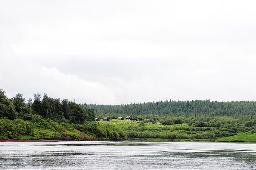 Our expedition left the cutter to take a walk along the river for a couple of
hours, but for some reason or other we particularly kept in our mind the short
encounter with one of the local residents.
Our expedition left the cutter to take a walk along the river for a couple of
hours, but for some reason or other we particularly kept in our mind the short
encounter with one of the local residents.
A deaf-mute, adolescent girl named Polina, who was aware that people had arrived in her taiga, had climbed up the highest hill, in order to patiently wait there for the guests. In spite of her age of 12 years she does not go to school, but prefers to associate with nature. For dogs, birds, trees “sympathize and understand” her just by the language of her eyes, the fine nuances of her mouth , her gestures and the staccato sounds produced by her voice. Her mother took her from the small lake-side cottage to this place in winter.
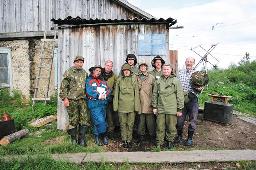 Galina, the young Selkupe woman (she did not tell us her surname) is amother of
six children. The two youngest are Igor and Ivan, six year-old twins, and Polina
lives in their “household”,as well; the others live and learn at the Farkovsk
Boarding School. And how does the “hosehold” of these Siberian aboriginees look
like? A boat, a couple of fishing nets, a snow mobile, a rifle – and this is
solely because they are from among the “wealthy” residents. The little ethnic
groups which are entrenched in this place do not like to grow vegetables and
organize everyday life according to a determinated schedule; they prefer to
strive for some mystic freedom, a kind of harmony with heaven, water and earth.
The natural elements give Evenks, Selkupes and Ketes and enormous strength.
Galya did not just come to Yanov Stan, “because it is so hard to live in the
forest”; she rather fell in love with a man of a pleasant outward appearance,
the only bachelor within a radius of hundreds of kilometers, the local head of
the meteorological station – Yuriy Korchagin.
Galina, the young Selkupe woman (she did not tell us her surname) is amother of
six children. The two youngest are Igor and Ivan, six year-old twins, and Polina
lives in their “household”,as well; the others live and learn at the Farkovsk
Boarding School. And how does the “hosehold” of these Siberian aboriginees look
like? A boat, a couple of fishing nets, a snow mobile, a rifle – and this is
solely because they are from among the “wealthy” residents. The little ethnic
groups which are entrenched in this place do not like to grow vegetables and
organize everyday life according to a determinated schedule; they prefer to
strive for some mystic freedom, a kind of harmony with heaven, water and earth.
The natural elements give Evenks, Selkupes and Ketes and enormous strength.
Galya did not just come to Yanov Stan, “because it is so hard to live in the
forest”; she rather fell in love with a man of a pleasant outward appearance,
the only bachelor within a radius of hundreds of kilometers, the local head of
the meteorological station – Yuriy Korchagin.
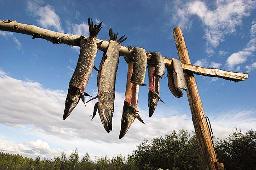 Yuriy Borisovich did not mull over this matter for a long time and returned her
affection. He lost his own family in early days, but is still keeping in touch
with his children. And there is no other bride in this remote wilderness.
Yuriy Borisovich did not mull over this matter for a long time and returned her
affection. He lost his own family in early days, but is still keeping in touch
with his children. And there is no other bride in this remote wilderness.
Yuriy worked for the inland marine.He was born in Taishet, Irkutsk Region, and finished the professional school of inland waterway transportation in the regional center. He hung around on ships, sailing from Krasnoyarsk to Dudinka and back from Dudinka to Krasnoyarsk. However, while working in this job, he (according to his own words) did not have the slightest chance to walk through green grass and white snow, lean against the trees, some of which have already been growing here for centuries, wash with fresh spring water … Although, judging from his constitution and morale, he is not a distinct contemplative person, he still seems to be some “extant” romantic. Having matriculated with the Institute of Technology and studied there for three years, he gave up and returned into the deep wilderness of the taiga.
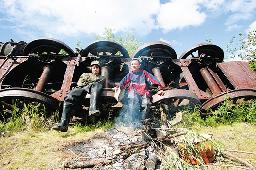 Nine years have passed, since he became the head of the meteorological station
and then, all of a sudden, set out for the Tjumen Region. Sharp tongues allege
that he, in all likelihood, has to clear a debt with someone, and that the time
was just ripe to liquidate him. The statute of limitation had elapsed.
Nine years have passed, since he became the head of the meteorological station
and then, all of a sudden, set out for the Tjumen Region. Sharp tongues allege
that he, in all likelihood, has to clear a debt with someone, and that the time
was just ripe to liquidate him. The statute of limitation had elapsed.
Galya does not suspect the forthcoming loss; I can imagine how much she will be afflicted with his leaving. The feeling of jealousy towards the man she fell in love with, would not even allow her to observe the holy guidelines of hospitality prevailing in this taiga region. And when, upon Yuriy’s invitation, we reached the entrance door, it quickly turned out that we were taking the risk to be poured with boiling water. It was not only me who received my just deserts, but allso Vladimir Pavlovskiy who was standing in the corner with an entirely innocent facial expression. Why,the hell, was he smiling at all?
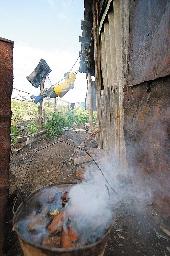 In all appearances these local rude manners are only considered as being rude
and barbarian by visitors. The residents of Yanov Stan usually deal with
eachother in friendly terms; and they always stick together. They are only two
well aware of the fact that loners have no chance to survive.
In all appearances these local rude manners are only considered as being rude
and barbarian by visitors. The residents of Yanov Stan usually deal with
eachother in friendly terms; and they always stick together. They are only two
well aware of the fact that loners have no chance to survive.
One of the big houses is split into work rooms and living space. A nice signboard indicates that this building houses the meteorological station of Yuriy Korchagin. He fetched the sign board from some secret drawer and finally was responsive to our pleas – he agreed to hang it up in front of the entrance, so that we could take a souvenir photo.
Five people belong to Korchagin’s staff (although twenty individuals live there altogether). Tatyana Aleksandrovna Kondrateva works as a senior technician; she is an experienced expert. One of her tasks is to transmit information about precipitation, cloudiness, barometric pressure and storm force twice a day – at midnight and at 8 o’clock in the morning.
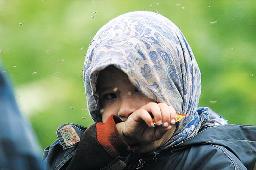 Tatyana removed here from Khakassia; before, she had a job with the
meteorological station in Sovetskaya Rechka. Three Selkupe sons live in the
Evenk colony, as well. Ivan followed in his parents’ footsteps. He is working
for the meteorological station. Kostya is a diesel engine specialist, Mikhail –
obtains the position of a hydrologist. And with Shenya, as you, dear reader,
might remember, we have already got acquainted earlier, for he was our “tour
guide” along Stalin’s railroad; he studies and lives in Farkovo.The little ones,
Sasha and Vova (from first marriage) – have their roots in Yanov Stan.
Tatyana removed here from Khakassia; before, she had a job with the
meteorological station in Sovetskaya Rechka. Three Selkupe sons live in the
Evenk colony, as well. Ivan followed in his parents’ footsteps. He is working
for the meteorological station. Kostya is a diesel engine specialist, Mikhail –
obtains the position of a hydrologist. And with Shenya, as you, dear reader,
might remember, we have already got acquainted earlier, for he was our “tour
guide” along Stalin’s railroad; he studies and lives in Farkovo.The little ones,
Sasha and Vova (from first marriage) – have their roots in Yanov Stan.
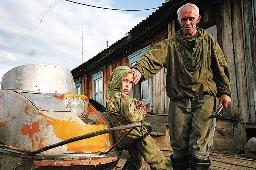 Vyacheslav Litvinov, Tatyana’s present husband, is a long-time resident of Yanov
Stan.
Vyacheslav Litvinov, Tatyana’s present husband, is a long-time resident of Yanov
Stan.
He always used to “hold the fort” and carried out his duties during all the years of the existence of the meteorological station, when the region did not dispose of enough money to perpetuate the meteorological service, although the station is already looking back to a fifty years’ history. The possibility to analyize atmospheric variations in these places was much valued by our Moscovitan scientists, who,in actual fact, had come here to study the condition of the Great Northern Railroad. They tore out a few “secret” pages from the meteorological record book and took their “treasure” back to Moscow.
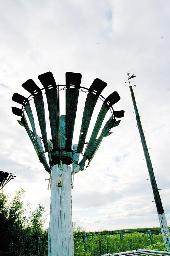 The family of the Arkadev-Petrushen’s from Goroshikha are related to the
Kondratev-Litvinovs. But even if this were not the case, they would be loved
ones of those who live in their immediate vicinity. In order to comprehend the
sense of these words it is entirely sufficient to just spend a single winter in
this place, when icy frost is lurking behind the windows, when the wind is
blowing with a sustaining sough and hungry woolves are sneaking about all over
the area.
The family of the Arkadev-Petrushen’s from Goroshikha are related to the
Kondratev-Litvinovs. But even if this were not the case, they would be loved
ones of those who live in their immediate vicinity. In order to comprehend the
sense of these words it is entirely sufficient to just spend a single winter in
this place, when icy frost is lurking behind the windows, when the wind is
blowing with a sustaining sough and hungry woolves are sneaking about all over
the area.
The residents of Yanov Stan use to store salted foodstuffs and … video tapes before the long, long winter begins. The women will be sitting in the parlor, busying themselves with stitching and sewing, while the men go hunting.
In the summer there is no time to be bored. The berries are getting ripe, mushrooms are growing. And it is the peak season for fishing. Kutters used to land at the river bank – they deliver foodstuffs and mail. You can navigate to Turukhansk or Krasnoyarsk, but even Yuriy Borisovich, who has a son living in the regional capital, does not leave the station very often. A big colony, a big town press down on this nature-loving forester; they depress him a lot more than thousands of kilometers of wild taiga, dead silence and the fear of the unknown.
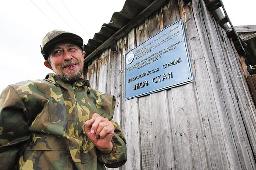 None of the residents of this “independent republic of Yanov Stan” (except the
head) wants to leave this place. They are waiting for visitors to come. In the
spring they have been waiting for the governor. But he did not come. Never mind!
The people here are very patient, they keep waiting and hope for him to arrive
one day. If only the weather does not change for the worse, they say –having in
mind the political situation, as well.
None of the residents of this “independent republic of Yanov Stan” (except the
head) wants to leave this place. They are waiting for visitors to come. In the
spring they have been waiting for the governor. But he did not come. Never mind!
The people here are very patient, they keep waiting and hope for him to arrive
one day. If only the weather does not change for the worse, they say –having in
mind the political situation, as well.
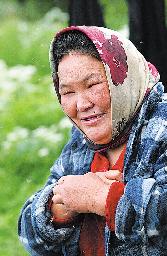
(to be continued)
Tatyana MAKOGONOVA
Photos: Aleksander Kuznetsov
“Krasnoyarsk Labourer”, 13.08.2005